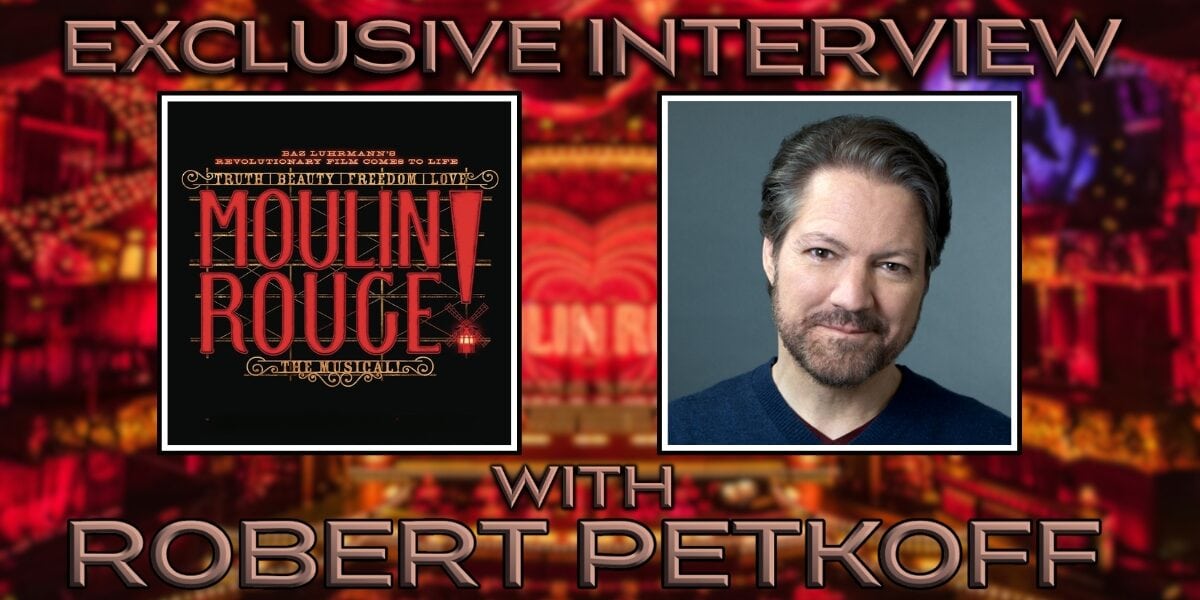Hello, chickens! And welcome to the Moulin Rouge, a magical place full of wonder and excitement! We’re beyond excited for Moulin Rouge the Musical to finally make it to Detroit, as it’s one of our favorites! Based on the 2001 Baz Luhrmann musical of the same name, this revamped jukebox musical brings a healthy dose of romance and just as much drama. Moulin Rouge the Musical is spending just about three weeks in Detroit, so ahead of its arrival, we sat down with Robert Petkoff, who stars as Harold Zidler in the show!
In this interview, Petkoff discusses what drew him to this role, what his audition process was like, how he balances the tonally difference aspects of the show, what some of the challenges have been to bringing Harold Zidler to life, and how his background in Shakespearean theater has helped him with his role in Moulin Rouge!
[Note: The highlighted excerpts below of this interview have been lightly edited for clarity. Warning for mild spoilers from Moulin Rouge. You can watch/listen to the full interview above, find it in most places podcasts are available, or read on.]
Timestamps for this interview:
- 00:00 – Intro
- 01:30 – Robert Petkoff talks about his character Harold Zidler in Moulin Rouge
- 02:40 – The pop songs featured in Moulin Rouge the Musical
- 04:50 – Seeing it in NYC, an incredibly fun show
- 05:20 – Changes to The Duke’s character, movie vs musical
- 06:33 – What sets the musical apart from the movie?
- 09:15 – The casting process
- 15:00 – Petkoff on what drew him to the character?
- 18:25 – Leading those big musical numbers
- 19:40 – Laughter in the performance
- 20:45 – Process to get into character
- 23:14 – Most challenging aspect of the part?
- 26:15 – How has your Shakespearean background helped with this role?
- 28:36 – Shows in one spot vs touring
- 32:20 – Traditions on tour, things to do in different cities
- 27:27 – Outros
Highlights from the interview with Robert Petkoff from Moulin Rouge the Musical
For those who aren’t familiar with it, can you tell us a little bit about Moulin Rouge and how your character, Harold, fits into the story?
Robert Petkoff: Yeah, you know, Moulin Rouge takes place at the famous Moulin Rouge in Paris, France. On the evening we join the show and the movie, Harold Zidler, who runs the Moulin Rouge, my character, is trying desperately to save it. He needs an influx of cash, and so he’s using his star Satine, who’s an incredible performer, but also a courtesan, to try to seduce the Duke, who is very wealthy to invest money in the show. All will go well if it all works out that way. But unfortunately for Harold, and fortunately for Satine, she meets a young man named Christian, who is in our production, a songwriter, in the movie he was a writer. And they fall in love as they do, and that creates the complication, of course because Satine would do her job like she always does… sex…. In this case, her heart gets in the way.
And so it’s this rollicking, wonderful, romantic, tragic, dramatic story that, at its heart, has over 70 pop songs that everyone knows. It’s amazing, you know, things like Elton John and the Rolling Stones, Sia and Rihanna and Adele, Lady Gaga, Britney Spears. I could go on and on. And so it’s this wonderful story that it’s really fun for me to watch the audience start to recognize the songs and sometimes sing along. I’ve done so many shows in my life. I’ve done multiple tours. It’s so much fun to do a tour of a show that people just beaming from ear to ear during the show.
With this being an adaptation of a movie, how do you feel that the musical sets itself apart?
Robert Petkoff: It sets itself apart in that they did the very wise thing of saying, okay, that that movie was from 1999, and we need some pop songs that speak to audiences today, as well as the classic pop songs. So I think that change was great. And again, as mentioned, you know, you can, you can hear it in the audience, in their response as they start to pick up the song that they hear.
And you know, some of these, listen, I say 70 songs. They’re not doing 70 full songs. Our show is not eight hours long, but, but it’s snippets of little songs. And like in the introduction to Christian, we hear just a little bit when they’re asking, like, where do you come from? Why are you here? What are you doing? Have you ever written a love song? Sing one of your love songs right now, and you know, he’s like, you know, “Never going to give you up.” and everyone, the audience, just starts laughing because they recognize a song and they know it.
So it’s that change, I think, is really great and really smart. And the change I mentioned with the Duke, I think they, they tried to make this story have a little more gravity, a little more seriousness. Because, you know, Baz Luhrmann movie is this explosion of anarchy in the opening and it, and it’s very much, you know, his style. Things pop out and they all, I think, I don’t ever think he has too many notes. Someone said that once, and I was like, not at all. It’s this crazy world he creates that at its core is this very serious story.
And I think the adaptation to the Broadway musical, the story just has more gravity to begin with, you know? I mean, it’s, certainly, it’s got silliness. It’s you know, but we welcome you to the Moulin Rouge. And the opening number, Harold welcomes you to the club. And they have this whole introduction. He explains what the club is, and he talks about it, and we see the patrons mingling with the people who work there. But it just has a little more weight to it throughout so that it has more, it feels like it has more substance. The musical, not that the movie doesn’t have substance at all. I don’t mean to say that at all, but it, I like that feeling that it, there’s, there’s a heavier heart to it. You know, at its core,
You had mentioned that this is a very fun character. But besides just being fun, what drew you to this character?
Yeah, you know, Harold Zidler is so complex. He, of course, first of all, what we see, he’s the showman, right? He’s delightful, and he’s fun, and he’s bubbly, and he’s inviting everyone into this great place. And he’s saying, please, welcome to the Moulin Rouge. This is not what you expect. This is a lovely place. But that underneath that is this desperation he has to keep this whole thing going, and so he’s got this intensity underneath him that he that is driving him throughout this desperation, that that causes him to veer from.
He loves Satine. Satine is like a daughter to him. They’ve been together for years, from when they were both on the streets, you know, entertaining on the streets, until he could build up into the Moulin Rouge. She’s always been his star, and he loves her like a daughter, but he’s also desperate to keep it going. So there’s times where he lashes out at her, there’s times where he’s not so nice to her, and there are other times where he isn’t, you know, but, but I love a character that isn’t one thing because no one is one thing, right? And oftentimes, as an actor, you have to bring the other things that weren’t written in this. It is definitely written in, and he’s just deliciously… he’s just got so much going on with him, from his intellect, from his is his drive, his sexuality, all of these things are at play, and they’re working. And so it makes this a really complex thing.
How do you feel your background in Shakespearean works has helped you with this role?
Robert Petkoff: Oh, yeah, very much. I mean, he’s a Shakespearean character. I mean, he’s larger than life in moments, I think sometimes the way we characterize Shakespeare, Shakespearen characters, is Shakespeare wrote these people who have emotions that are as human as we are. But sometimes they are all turned up a little bit. They are larger than life, in a way.
And it’s not to say that when you’re acting in Shakespeare, you act larger than life. It’s just that, if you’re going to watch Hamlet, if you’re going to watch Lear, any of those things, you’re going to see the gamut of human emotions, from A to Z, you’re not going to go from A to D, you know? And so that’s what Harold does. Harold goes through everything in one evening.
And just the ability to speak in a way that isn’t pedestrian, you know, you could very easily play any character in, I say pedestrian, in a way that is just very natural and very there. But if I came out every night, and I was like, “Hello chickens. Yes, it’s me your own beloved Harold Zidler in the flesh,” you know, as opposed to “Hello chickens! Yes, it’s me your own beloved Harold Zidler in the flesh!” You know, there’s a variety there. There’s a whole thing and, and I, I feel like I learned that doing Shakespeare verse to play with language.
I love language. I love words. I love Shakespeare’s use of words, and I love our use of words here, and so it’s that definitely crosses over. I think if there’s a character who’s the most Shakespearean in the play, it’s Harold Zidler. And so all of that work with language, really comes through with Harold because he does, he delights in language. He delights in using words that you might not use in your every, average, everyday speech. He’s a showman.
Catch Moulin Rouge the Musical when it comes to a city near you
find it in most places podcasts are available Catch it when it comes to a city near you, and if you’re in the Detroit area, don’t miss its residency at the Detroit Opera House from September 17 through October 6th, through Broadway in Detroit!



